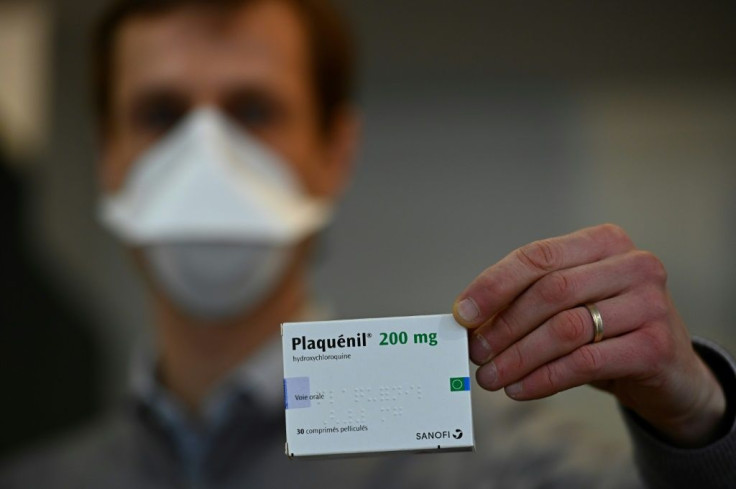The Latest On Hydroxychloroquine Treatment For Coronavirus: Lancet Study Concludes It's Dangerous, Not Effective

KEY POINTS
- Trump has long touted the use of hydroxychloroquine as a COVID-19 treatment despite scant evidence it's effective
- The study found patients given the drug, with or without antibiotics, were more likely to develop heart rhythm problems and had a higher chance of death
- The study examined the medical records of 96,000 patients around the world
A study published Friday by the medical journal Lancet found more patients treated with President Trump’s long-touted antimalaria treatment for COVID-19 died than recovered. Trump said Monday he was taking the drug as a prophylactic to ward off the coronavirus despite warnings it could cause heart problems and other side effects.
The study, the largest to-date looking at the efficacy of hydroxychloroquine and chloroquine, involved an examination of medical records for 96,000 people hospitalized between Dec. 20 and April 14 at 67 facilities around the world for COVID-19 and treated with the antimalaria drugs. The patients had a mean age of 54. Fifty-three percent were men.
Those who received Gilead’s remdesivir treatment were excluded from the study.
“We were unable to confirm a benefit of hydroxychloroquine or chloroquine, when used alone or with a [an antibiotic], on in-hospital outcomes for COVID-19. Each of these drug regimens was associated with decreased in-hospital survival and an increased frequency of ventricular arrhythmias when used for treatment of COVID-19,” the researchers from Harvard and other institutions concluded.
“Our findings suggest not only an absence of therapeutic benefit but also potential harm with the use of hydroxychloroquine or chloroquine drug regimens … in hospitalized patients with COVID-19.”
In addition to malaria, the two drugs are used to treat autoimmune diseases like lupus and rheumatoid arthritis, and have been shown to have antiviral properties.
“If there was ever hope for this drug, this is the death of it,” Eric Topol, a cardiologist and director of the Scripps Research Translational Institute, told the Washington Post.
The study backs up earlier reports of scant or no evidence the drugs were useful in treating coronavirus. The Food and Drug Administration last month issued a warning against their use. Sales of hydroxychloroquine have been soaring, doubling from last year to $50 million in March, data firm IQVIA reported.
About 15% of the patients were treated with the antimalaria drugs alone or with an antibiotic within 48 hours of diagnosis. Those who took hydroxychloroquine were 34% more likely to die and were 137% more likely to develop heart rhythm problems. For those who received hydroxychloroquine plus an antibiotic, the death risk increased to 45% and heart problems to 411%.
Lead author Mandeep Mehra, a Harvard Medical School professor and doctor at Brigham and Women’s Hospital, told the Post in retrospect it was unwise to put the drugs into widespread use without systematic testing, but “a desperate disease demands desperate measures.”
In an offhand remark Monday, Trump revealed he had been taking hydroxychloroquine for more than a week, insisting “a lot of good things have come out about the hydroxy. … You’d be surprised at how many people are taking it. … I happen to be taking it.”
Trump has two major risk factors when it comes to COVID-19: He’s over 65 and considerably overweight.
© Copyright IBTimes 2024. All rights reserved.






















